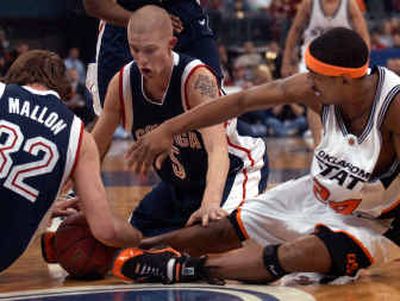Work often lost in the hoopla

Even though Tom Smith works at a sports collectibles shop in Bear, Del., he rarely watches college basketball during the regular season. Since he lives in Rising Sun, Md., he will occasionally watch an important University of Maryland game.
But that’s it.
Despite his apathy, Smith found himself transformed from casual observer to super fan Sunday when the brackets were announced for the NCAA tournament, the three-week basketball blowout known as “March Madness.”
Like many others, he’ll be scrawling his picks onto a copy of the 65-team elimination bracket this week, hoping to win a little cash and show his family, friends and co-workers that fortune shines even on those who are blissfully ignorant about basketball.
Across the nation, ardent nonfans suddenly find themselves afflicted with this month’s Madness. They huddle around TV sets during work, agonize cluelessly over office pools and occasionally give employers an acute case of anxiety over plunging productivity while key games are played.
Challenger, Gray & Christmas Inc., a Chicago-based employment consultancy firm, estimates that U.S. businesses could lose up to $890 million because of a hoops-spawned slowdown over the next three weeks. John Challenger, chief executive of the firm, notes that many games are played in the morning and afternoon hours of the workweek.
“Everybody probably knows at least one person who may not watch a single college basketball game all season but suddenly starts checking scores on the Internet every 30 minutes,” Challenger said.
Challenger’s analysis found employees could spend up to 13 minutes per business day checking scores and statistics on the Internet. Spread 13 minutes a day over 16 business days and the impact on business mounts. And that doesn’t even include the spontaneous huddles around a television to watch the final minutes of a tight game.
Michael Sachs, a sports psychologist at Temple University in Philadelphia, said March Madness draws nonbasketball fans for several reasons. First are the pools. Just about every office has one and they are easy to join. And since upsets are common, it gives nonbasketball fans like Smith a good chance at winning.
“The stakes are low, but it’s equal opportunity,” Sachs said. “Everyone has a shot.”
For Smith, 33, things paid off in 2002, when he won his pool despite his lack of expertise. He picked the Maryland Terrapins to win it all. “When you go into it blind, you probably have more luck because you won’t just play favorites.”
Another reason for its popularity is the sheer number of teams and the number of television markets with a local team in the tournament.
“Everyone is bound to have some sort of a connection with one of the teams,” Sachs said.
The Buffalo Wild Wings restaurant chain, which has 310 locations in 31 states, offers an online “bracket challenge” for customers, with the winner taking home a camcorder. On Thursday, it didn’t take long for Buffalo Wild Wings owner Bobby Pancake to see that college basketball is hot.
For the first time in months, he had customers barking at the staff asking that the five big-screen and 35 smaller televisions be switched from game to game at the Bear, Del., restaurant.
And that was just for the conference tournaments.
“It’s been a job just changing TV stations,” Pancake said.